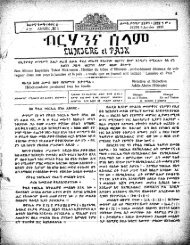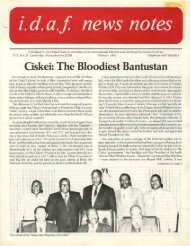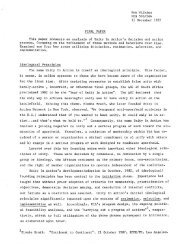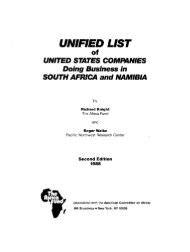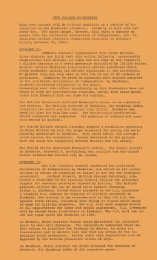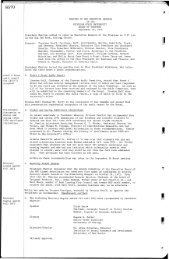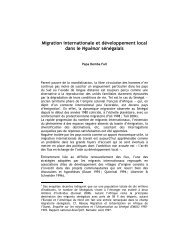the churches and southern africa - KORA
the churches and southern africa - KORA
the churches and southern africa - KORA
Create successful ePaper yourself
Turn your PDF publications into a flip-book with our unique Google optimized e-Paper software.
discussion of <strong>the</strong> establishment of a regional Pan-African<br />
defense force. Nigeria suggested <strong>the</strong> placement of such a<br />
force in territories neighboring <strong>the</strong> Sou<strong>the</strong>rn African<br />
regimes. It was recommended that states provide military<br />
aid to each o<strong>the</strong>r, pending <strong>the</strong> establishment of an<br />
Executive Secretariat of Defense. Some speculate that this<br />
increased concern with military matters reflects a growing<br />
concensus on strategy toward <strong>the</strong> Portuguese, especially<br />
in Guinea-Bissau <strong>and</strong> Mozambique. (Resolutions; Star,<br />
Johannesburg, June 17, 1972; Observer, London, June<br />
18, 1972; Daily News, Tanzania, June 9, 1972)<br />
Various traditional disputes were reconciled at <strong>the</strong><br />
meeting including frontier spats between Algeria <strong>and</strong><br />
Morocco; a rapprochement between Congo <strong>and</strong> Zaire,<br />
Senegal <strong>and</strong> Guinea, Ghana <strong>and</strong> Guina <strong>and</strong> ti'e two<br />
Angolan movements, FNLA <strong>and</strong> MPLA (see<br />
PORTUGUESE SECTION, this issue).<br />
A change in <strong>the</strong> OAU image was also shown when <strong>the</strong><br />
Secretary General Diallo Telli was replaced by<br />
Camerounian Nzo Ekangaki. It is rumored that Telli, who<br />
created controversy within Africa <strong>and</strong> externally, will<br />
become head of <strong>the</strong> OAU Information Office in Geneva.<br />
(Agence Frahce Presse, June 17, 1972)<br />
All in all <strong>the</strong> summit seemed to indicate a dimunition<br />
of <strong>the</strong> former emphasis on a peaceful communicative<br />
solution to <strong>the</strong> Sou<strong>the</strong>rn African dilemma, <strong>and</strong> a move to<br />
a more defined affirmation of <strong>the</strong> necessity to aid <strong>the</strong><br />
armed struggle of <strong>the</strong> liberation movements. As yet action<br />
beyond this, in terms of military tactics or economic<br />
moves against <strong>the</strong> West (Portugal <strong>and</strong> South Africa) are,<br />
not surprisingly, weak.<br />
I THE PORTUGUESE TERRITORIESI<br />
INTERNAL PORTUGUESE RESISTANCE<br />
TAKES VARIOUS FORMS<br />
Nearly 40,000 people (one-tenth of <strong>the</strong> total<br />
population) in <strong>the</strong> second largest Portuguese city, Oporto,<br />
demonstrated on April 15 against <strong>the</strong> rising cost of living,<br />
against fascism <strong>and</strong> <strong>the</strong> colonial wars. Police with<br />
truncheons <strong>and</strong> dogs charged <strong>the</strong> demonstrators,<br />
wounding many <strong>and</strong> arresting dozens. Wide protests<br />
against <strong>the</strong> arrests led to <strong>the</strong> release of most of those<br />
detained.<br />
Student strikes, occupations, <strong>and</strong> demonstrations this<br />
year have included <strong>the</strong> Commercial Institute strike; a<br />
strike in <strong>the</strong> Law <strong>and</strong> Letters Faculties of <strong>the</strong> Agronomics<br />
Institute in February <strong>and</strong> March; a May 16 occupation by<br />
Engineering <strong>and</strong> Economics university students of <strong>the</strong>ir<br />
Institutes; <strong>and</strong> street demonstrations by hundreds of<br />
students in Lisbon on May 24 <strong>and</strong> 26 against <strong>the</strong><br />
government.<br />
Workers also continued struggles for better conditions,<br />
<strong>and</strong> against fascism <strong>and</strong> <strong>the</strong> monopolies. Work stoppages<br />
were reported in <strong>the</strong> Sitenor jute factory in Matosinhos,<br />
in <strong>the</strong> C.U.F. in Barreiro, <strong>and</strong> in <strong>the</strong> Ferreirinha metal<br />
factory in Oporto. There was a go-slow in <strong>the</strong> State Mint<br />
in Lisbon, <strong>and</strong> various o<strong>the</strong>r workers continued agitation<br />
for improvements in Venda Nova, Lisbon, Oporto.<br />
Activity among small farmers has included a<br />
cl<strong>and</strong>estine publication <strong>and</strong> reoccupation of common<br />
l<strong>and</strong>. Reportedly NCO conscripts in <strong>the</strong> barracks at Tavira<br />
<strong>and</strong> conscript officers in <strong>the</strong> barracks at Mafra have also<br />
recently been resisting <strong>the</strong> military <strong>and</strong> opposing <strong>the</strong><br />
colonial wars, <strong>and</strong> in many cases, deserting. (Portuguese<br />
<strong>and</strong> Colonial Bulletin, Engl<strong>and</strong>, July 1972)<br />
PORTUGUESE TRADE DEFICIT HIGHEST EVER<br />
The 1971 trade deficit of Portugal was <strong>the</strong> highest in<br />
Portuguese history, showing a 21% increase over 1970. An<br />
analysis of <strong>the</strong> figures shows <strong>the</strong> dual position of Portugal<br />
as a colonial power <strong>and</strong> as a state dominated by <strong>the</strong> larger<br />
western powers. Portugal buys from foreign countries<br />
over five times <strong>the</strong> value of goods that it buys from all its<br />
colonies. West Germany <strong>and</strong> Britain each export more to<br />
Portugal than <strong>the</strong> combined colonies do. Portugal also<br />
exports to foreign countries nearly four times <strong>the</strong> value of<br />
goods exported to <strong>the</strong> colorties. Again Britain buys more<br />
than all <strong>the</strong> colonies combined. (Portuguese Colonial<br />
Bulletin, July, 1972)<br />
PREMIER CAETANO TELLS PORTUGUESE PEOPLE<br />
REVOLT IS NONEXISTENT<br />
Premier Marcello Caetano in a radio <strong>and</strong> television<br />
"family chat" with <strong>the</strong> Portuguese people called for <strong>the</strong><br />
re-election of President Americo Tomas as a symbol, of<br />
unity against "misguided terrorists ... from outside <strong>the</strong><br />
country." He strongly denied charges of waging a<br />
"colonial war" in Africa. No one, he said, can find<br />
populations in revolt or any internal uprising in Angola,<br />
Mozambique, or Portuguese Guinea. The military forces<br />
<strong>the</strong>re, he said, "are not making war. They are assuring<br />
peace." (International Herald Tribune, July 5, 1972)<br />
Thomaz was inaugurated on August 9 only six hours after<br />
bombs planted by anti-government forces had cut 30% of<br />
Lisbon's <strong>and</strong> all of Oporto's electric power. (New York<br />
Times, Aug. 10, 1972)<br />
PORTUGAL AND THE INTERNATIONAL LABOR<br />
ORGANIZATION (ILO)<br />
At its 57th session in Geneva in 1972, <strong>the</strong> General<br />
Conference of <strong>the</strong> International Labor Organization<br />
passed a strong resolution in which it pledged "<strong>the</strong> entire<br />
support <strong>and</strong> effective action" of <strong>the</strong> ILO to "<strong>the</strong> lawful<br />
struggle of <strong>the</strong> peoples of Angola, Mozambique, <strong>and</strong><br />
Guinea (Bissau) for self-determination <strong>and</strong> civil trade<br />
union liberties"; condemned Portugal for constant<br />
violation of human, civil, <strong>and</strong> trade union rights; urged<br />
member States <strong>and</strong> employees' <strong>and</strong> workers' organizations<br />
to intensify efforts to give effective aid to <strong>the</strong> people


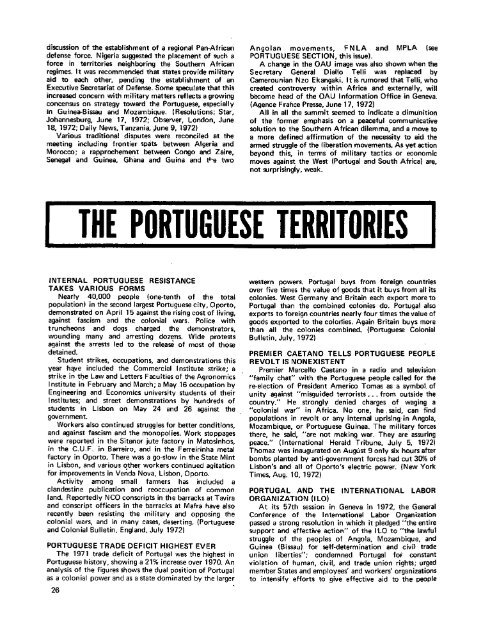
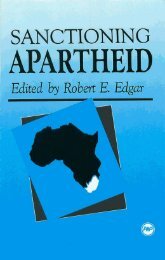
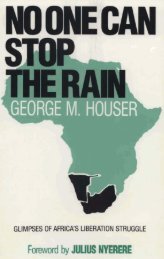

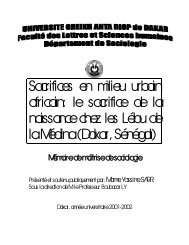
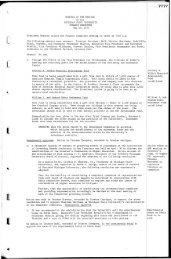
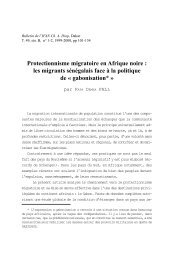
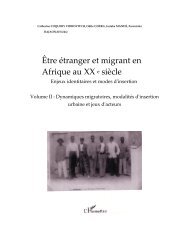
![Synthèse [6] DEFALL..INSTRAW.pdf - Matrix](https://img.yumpu.com/17880734/1/190x245/synthese-6-defallinstrawpdf-matrix.jpg?quality=85)
